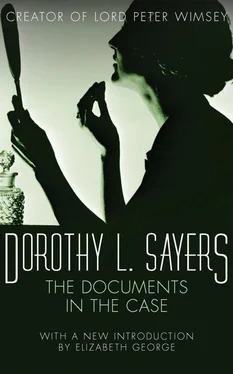I next obtained the address of the labourer, Harold Coffin. His wife was at home, and informed me that I should find her husband at work carting some timber which had fallen in the recent gale. If I followed the lane leading down past ‘The Shack’ I could not miss him. Following these directions, I came upon him on the outskirts of a small wood. He was very ready to tell me all he knew, and led me at once to the spot, not very far away, where he had last seen my father.
It was, of course, too late in the season for Amanita rubescens , but the site which he pointed out seemed suitable enough for it, and he also, without being prompted, mentioned that he had often seen fungi growing there, of a reddish-brown colour with grey patches on the top. I took Edible and Poisonous Fungi from my pocket and asked him to look through it. He hesitated some time between the pictures of Amanita rubescens and Amanita muscaria , and finally said he thought it might be one of those two. The colour of Amanita muscaria seemed a bit overdone, he thought, but then, pictures in books wasn’t always right, was they, sir? The wood, locally known as Five-Acre Wood, was a great place for toadstools, and he had often seen my father gathering the great Hepatica fungus from the trees — the huge liver-coloured lumps commonly known as ‘Poor Man’s Beefsteak’. Coffin was quite clear that my father was actually gathering fungi, and not merely looking for them. My father had spoken to him and said something about, ‘Getting my supper, you see, Coffin. You ought to try some yourself; you’re missing a treat.’ Coffin had often thought of those cheerful words when he heard of the poor gentleman’s death, and had taken them as a warning.
Coffin said he knew Mr Lathom quite well by sight, having met him from time to time in the public-house when having a friendly glass. He had never seen him in the Five-Acre Wood but once, and that was with Mr Harrison, about a week before the latter’s death. His own work had lain in and about the Five-Acre during the first fortnight of October — he was employed by Mr Carey — all this round here was Mr Carey’s land — and he thought he should have seen Mr Lathom if he had come there alone at any time.
Having thanked and rewarded Coffin, I made my way to ‘The Shack’. Except for the removal of the bedclothes and other objects required for the inquest it was exactly as it had been left at the time of the death. The broken bedstead, with its terrible witness to my poor father’s death-agony, still stood in a corner of the bedmom. Even Lathom’s painting materials lay huddled in a corner. I suppose he had forgotten to remove them. A few roughly-daubed canvases in oil contrasted strongly with my father’s delicate water-colours, of which I found a number put away in a drawer. Dust had gathered thickly everywhere.
I made a careful search on shelves and in drawers for any notes or papers that might throw light on my problem, but found nothing except a few bills and the letter my father had received from me. There were one or two novels, a number of local guide-books and botanical books of reference, and some artist’s catalogues. Delving among these, I at length came on a large-scale map of the district, with notes upon it in my father’s handwriting. He had apparently used it as a kind of botanical chart, marking on it the localities in which various plants and fungi were to be found. Five-Acre Wood was clearly shown, and upon it my father had made a small cross accompanied by the note ‘ Amanita rubescens ’. I looked for any mention of Amanita muscaria , but could see none; either my father had not found it in the district, or else he had concerned himself with edible varieties only.
One question, therefore, seemed clearly answered. My father had , without question, been gathering fungi for his supper on the 17th October, and the place where he had gathered them was a place in which he was accustomed to find Amanita rubescens .
I could find nothing further of any interest at ‘The Shack’, though I spent a whole day there. I passed the night at the inn, and next day departed to Bovey Tracey to check Lathom’s movements.
My first interview was with the taxi-driver. This man’s name is William Johnson and he lives in the High Street. He perfectly recollects having driven to Manaton on Thursday, 17th October, and taken Lathom to catch the 8.13. The circumstances had been strongly impressed upon his mind by the catastrophe that followed it closely, and the fact that he had actually visited ‘The Shack’ and seen the victim, only two days before the discovery of the body, has naturally made him a kind of local hero.
He is positive that my father and Lathom parted on the best of terms. They shook hands, and my father said: ‘Well, hope you have a good journey. See you back on Saturday. What train do you think you’ll catch? Lathom answered that he wasn’t quite sure, and added: ‘Don’t wait up for me if I’m late.’
This answers one of our questions, and makes it quite clear that at least one person besides my father knew that Lathom was expected back on the Saturday.
My next question was, At what time had Lathom ordered his taxi? The man remembered this too. A telephone message was put through to him from Manaton at about nine o’clock on the Wednesday evening. He can verify this, if necessary, by his order-book.
This is interesting. It makes it seem likely that Lathom only decided to make this trip to town at the last moment — in fact, after hearing my father express his intention of gathering Amanita rubescens the following day.
Finally, I inquired whether Johnson had actually seen Lathom get into the train. By a stroke of good fortune he was able to answer this question definitely. He had put a parcel on the train for a printer at Bovey Tracey, and, while doing this, he had seen Lathom take his seat in a third-class smoker. As the train went out, Lathom leaned out of the window and shouted something to a porter — some question, he thought, about changing at Newton Abbot.
I hired this man’s taxi, which was a reasonably good one, and interviewed the railway staff at the three intermediate stations between Bovey Tracey and Newton Abbot. Here, as was natural, the men found some difficulty in remembering the events of three months ago. I could not find anybody who recollected seeing Lathom. In each place I asked for a name of anybody in the village who might be likely to have a car or motor-cycle for hire, and went to see the proprietors of the vehicles, but without result. Nowhere could I find any record of such a transaction.
Newton Abbot is a larger place, and I anticipated difficulty. On the contrary, and greatly to my surprise, I got on to Lathom’s trail almost immediately. No sooner had I mentioned his name to the station-master than he said at once:
‘Oh, yes, sir — that was the gentleman who lost a pocket-book last October. Did he ever find it?’
Taking this cue as it presented itself, I replied that he had not, and that, being in the neighbourhood, I had promised to call and ask about it.
‘Well, sir,’ said the station-master, ‘we made inquiries all down the line, and had several men out searching, but they never found it. They would have brought it to me if they had, for they were all decent fellows and Mr Lathom offered a reward. I’m afraid some tramp must have picked it up, sir. There’s a lot of them about these days and they’re not over-honest.’
‘No doubt that was it,’ said I. ‘Let me see — whereabouts did he say he lost it?’
‘Said he thought it must have fallen out from his breast-pocket when he was leaning out of the window. He couldn’t say exactly where, but he thought it must be just the other side of Heathfield. Here’s the note I made in my book, you see, sir, and here’s the gentleman’s name and address that he wrote down himself.’
Читать дальше












